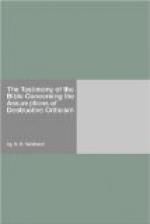VIII. THE HISTORICITY OF THE BOOK OF JONAH.
"According to the word of the Lord God of Israel, which he spake by the hand of his servant Jonah, the son of Amittai the prophet, which was of Gath-hepher.” 2 Kings xiv. 25.
"The word of the Lord came unto Jonah, the son of Amittai, saying, Arise go to Nineveh, that great city, and cry against it: for their wickedness is come up before me.” Jonah i. 1, 2.
"So Jonah arose and went unto Nineveh, according to the word of the Lord.” Jonah iii.. 3.
"And he cried, and said, Yet forty days, and Nineveh shall be overthrown.” Jonah iii. 4.
"So the people of Nineveh believed God.” Jonah iii. 5.
"And God saw their works, that they turned from their evil way; and God repented of the evil that he had said he would do unto them, and he did it not.” Jonah iii. 10.
"The men of Nineveh shall rise in judgment with this generation, and shall condemn it, because they repented at the preaching of Jonas.” Matt. xii. 41.
The book of Jonah has been attacked by the destructive critics. Its historicity has been denied. The critics, though certain of almost all of their objections to the Bible, have not all decided whether it is “based on history, or is a nature myth.” Keunen has discovered (?) that it is “a product of the opposition to the strict and exclusive policy of Ezra toward heathen nations.” Objection is made to the historical statements of the book on various grounds. The objector interposes this difficulty: “Can we conceive of a heathen city being converted by an obscure foreign prophet?”
This objection is of kin to that which can not conceive that by a creative act of God the universe was brought into being, or the inspired statement that “the worlds were framed by the word of God.” It is the presence of the supernatural everywhere that is beyond the conception of the critics.
Again, they interpose the difficulty: “How could the Ninevites give credence to a man who was not a servant of Ashur?”
Without presenting the multiplied difficulties that rationalism has supposedly discovered, they may be summed up in their statement substantially, that the book of Jonah is not historical. Whatever else it may be, whether legend, myth or allegory, it is not history.
We turn again from the fancies of “Expert Scholarship” to the testimony of the Bible concerning itself. We discover that the prophet Jonah is referred to several hundred years before the critics have permitted him to live. It is written in 2 Kings xiv. 25 that Jeroboam the Second secured the restoration of certain territory, “according to the word of the Lord God of Israel, which he spake by the hand of his servant Jonah, the son of Amittai the prophet, which was of Gath-hepher.”
The name of Jonah, of his family, and the place of residence of his family, are definitely stated. The work is accomplished “by the hand of his servant Jonah,” and the date of its accomplishment, is so precisely recorded that these statements could have been disproved had they been false. Hence, there was a person named Jonah.




